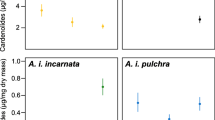Summary.
Conium maculatum is an apiaceous species native to Eurasia that is highly toxic to vertebrates due to the presence of piperidine alkaloids, including coniine and γ-coniceine. More than 200 years after invading the United States this species remains mostly free from generalist insect herbivores. The presence of novel chemical defenses in the introduced range could provide invasive species with a competitive advantage relative to native plants. The cabbage looper (Trichoplusia ni) is a generalist lepidopteran found throughout the US that occasionally feeds on C. maculatum. We evaluated the toxicity of piperidine alkaloids to T. ni and determined putative resistance mechanisms, both behavioral and physiological, that allows this insect to develop successfully on C. maculatum foliage. T. ni larvae raised on diets enriched with coniine and γ-coniceine showed a decrease in consumption and longer development time, but no effects on growth were found at any alkaloid concentration. In a diet choice experiment T. ni larvae showed no avoidance of alkaloid-enriched diets, suggesting that the deterrence produced by alkaloids was related to a post-ingestive metabolic response. The ability of T. ni to consume diets high in alkaloid content could be due to at least three different mechanisms: 1) a decreased consumption rate, 2) efficient excretion of at least 1/3 of ingested alkaloids unmetabolized in frass, and 3) partial detoxification of alkaloids by cytochrome P450 s, as shown by the decreased larval growth in the presence of piperonyl butoxide, a P450 inhibitor. Even though T. ni tolerates C. maculatum alkaloids, the use of this species as a host plant could be ecologically disadvantageous due to prolonged larval growth and thus increased exposure to predators. Novel plant secondary compounds do not guarantee increased resistance to generalist herbivores.
Similar content being viewed by others
Author information
Authors and Affiliations
Corresponding author
Rights and permissions
About this article
Cite this article
Castells, E., Berenbaum, M.R. Resistance of the generalist moth Trichoplusia ni (Noctuidae) to a novel chemical defense in the invasive plant Conium maculatum . Chemoecology 18, 11–18 (2008). https://doi.org/10.1007/s00049-007-0388-6
Received:
Accepted:
Published:
Issue Date:
DOI: https://doi.org/10.1007/s00049-007-0388-6




